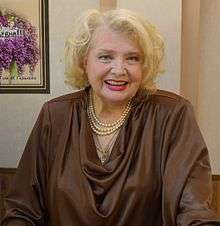Tatiana Doronina

Tatiana (Tatyana) Vasilyevna Doronina (Russian: Татьяна Васильевна Доронина; born 12 September 1933) is a popular Soviet/Russian actress who has performed in movies and the theater.[1] She is generally regarded as one of the most talented actresses of her generation and was named a People's Artist of the USSR in 1981.[2]
She was born in Leningrad. After graduating the MKhAT theatre school in Moscow, she returned to Leningrad and joined the Bolshoi Drama Theatre directed by Georgy Tovstonogov.
After moving to Moscow Doronina worked at the Mayakovsky Theater and then at MKhAT. Her major roles were Arkadina in The Seagull by Chekhov, Dulcinea del Toboso in a play by Alexander Volodin, Queen Elizabeth of England and Mary Stuart in Vivat Regina.
“All the films she starred in, though regrettably few, are now considered classics. Most directors believed she was too theatrical for the movies and refused to take her on. Georgy Natanson reversed that unfair judgment by giving her the lead parts in The Elder Sister and Once More about Love. Both had a tremendous success making Doronina a huge film star. Young girls imitated her hair-do and her manner of speaking. People queued up for hours to get tickets for Once More about Love in which she played a flight attendant, the role that earned her the best Soviet actress title in 1968. Doronina's profoundly romantic heroines could sacrifice everything for love. She rendered the love theme the way no actress did. In almost every of her films she would sing a song, which in her presentation turned into a small drama. In Three Poplars on Plyuschikha she plays a plain country woman who, although married, has never experienced love and puts the anguish tormenting her heart into a song called Tenderness” says Russian Cultural Navigator[3]

At present Doronina is artistic director of the Gorky MKhAT, a job she accepted when MKhAT split into two independent troupes.
Her former husbands included Edvard Radzinsky, a popular Russian writer and historian, and actors Oleg Basilashvili and Boris Khimichev.[2]
Honours and awards
- Order of Merit for the Fatherland;
- 3rd class (11 June 2003) - for outstanding contribution to the development of theatrical art[4]
- 4th class (23 October 1998) - for many years of fruitful work in the field of theatrical art, and in connection with the 100th anniversary of the Moscow Art Theatre
- Order of Honour (8 September 2008) - for outstanding contribution to the development of domestic theatrical and cinematic arts, many years of creative activity
- Order of Friendship of Peoples (20 June 1994) - for great achievements in the field of theatrical arts
- Tsarskoselskaya Art Prize (18 October 2011 - "For the grace and inspiration of the images in the theatre and film"
- People's Artist of USSR
- People's Artist of the RSFSR[5]
- Merited Artist of the RSFSR
References
- ↑ — «Спортивные сцены 1981 г.»
- 1 2 Татьяна Доронина в энциклопедии «Кругосвет»
- ↑ "Руководство МХАТ имени М. Горького". МХТ им. Горького (официальный сайт). Archived from the original on 2012-08-05. Retrieved 2012-07-29.
- ↑ Указ Президента РФ от 11.06.2003 № 669
- ↑ Татьяна Доронина — Российские и советские актёры